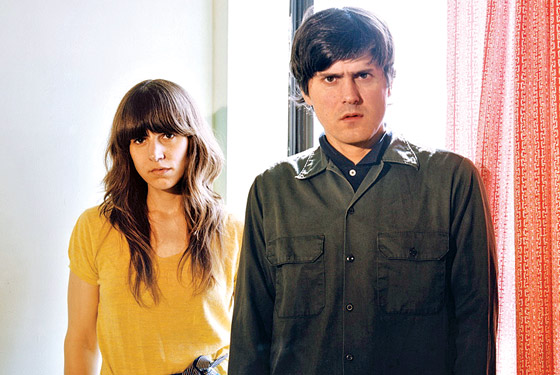
Eleanor and Matthew Friedberger grew up as musically curious, loafer-wearing siblings in Oak Park, Illinois. In 2000, Eleanor moved to Greenpoint, where she started singing at house parties. When Matthew moved here six months later, they decided to collaborate. Eleanor sang, and Matthew wrote sprawling narrative songs and manned a myriad of instruments, including guitar and electronic percussion (tack piano and Optigan). Such were the humble beginnings of the Fiery Furnaces, who last week released their sixth album, Widow City. It’s their most accessible and coherent to date. Psychedelic sounds are broken by sweet acoustic melodies; Eleanor’s strident vocals, offset by distant cartoonish voices, tell absurdist stories about Egyptian scholars, spiritual gurus, and unhappy wives imagined from the pages of seventies lifestyle magazines. Matthew, 35, and Eleanor, 31, spoke to Emma Pearse about their suburban childhood, the art of arguing when your business partner is also your only sibling, and their next project: a rock-and-roll-themed ballet.
Your 2005 album, Rehearsing My Choir, was based on your grandmother. Is the narrative of Widow City, with songs like “Uncle Charlie,” again based on family?
Eleanor: Not at all. Uncle Charlie, he’s pure fiction.
Matthew: People are always asking us if the songs are personal. Then, when we did the album about our grandmother, people didn’t bother to ask whether it really was based on our grandmother. On it, she plays a character very much like herself. Widow City is not about our personal family, although one of the songs is. Right, Eleanor?
E: “Restorative Beer”? It’s not about our mom personally, but she often says that: “Let’s have a restorative beer.’’
Being brother and sister, do you get tired of being psychoanalyzed as such?
M: It’s our own fault. We did have an argument when we were signing on for our first record. I suggested we have fake names and not say that we were brother and sister. Eleanor won that argument.
E: I just thought it was silly. We never had that playful kind of relationship when we were kids, and suddenly now we’re going to become like a gang with new names? It didn’t make any sense.
Did you play music together as kids?
M: No, we only played catch together. Eleanor was a better athlete than me.
E: We used to play war, and we’d have Eleanorville and Matthewville and play in our bedrooms. Later on, our rooms were next to each other, so everything Matt listened to as a kid, I listened to also. There was no choice.
M: I had The Rolling Stone Record Guide, the second edition of it. I would go and buy records that were five stars—Electric Ladyland [the Jimi Hendrix Experience] and Gang of Four, Entertainment. And then whatever else they had on the fourth floor of Rose Records in Chicago.
So how did the band come about?
E: When I moved to New York, I just started playing music on my own. And when Matt moved to New York, it made perfect sense to play together.
M: It worked because it wasn’t fraught with any kind of weird social thing. When you have to play with someone new, maybe you won’t like them or maybe they’ll call you too often.
Do you fight much?
E: We get right to the point. There’s no meltdown and days of recovery.
M: It’s not that you can’t offend each other, but you’re not offended by them annoying you. People become status conscious in friendships, and when they do offend, there’s a lot of energy spent on getting it back to equilibrium. But we’re not friends, we’re siblings.
Who is the better musician?
E: Matt writes a hell of a lot more music than I do.
M: Yeah, I consider myself the better musician. But Eleanor is the better singer.
E: Thanks, Matt.
You are known for esoteric narratives—as intellectual rockers, perhaps.
M: We think we play records based on big, successful classic-rock records: Syd Barrett, Pink Floyd, the Who. And nowadays we like rock-and-roll records even better—I like Chuck Berry and Muddy Waters better than I like the Beatles and the Who. Our records are pretty complicated, but not as an intellectual exercise.
I’ve heard you are working on a rock-and-roll-themed ballet. What’s it about?
M: We are trying to develop a narrative rock-and-roll choreography that requires no athletic ability or natural grace to dance. It’ll be comprised solely of hand gestures and will be a combination of American Sign Language and flipping people off.
Is there a market for indie ballets?
M: Whether there’s a market for something is surely not our concern. We would appreciate any donations or grants that would allow us to further this important research, however.
Widow City
Thrill Jockey, October 9, $13.